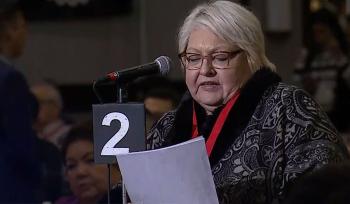Image Caption
Summary
Local Journalism Initiative Reporter
Windspeaker.com
Chiefs have added their voice to the growing outcry against the federal government’s gun control legislation by passing an emergency draft resolution on the final day of the three-day Assembly of First Nation’s Special Chiefs Assembly.
Bill C-21, An act to amend certain Acts and to make certain consequential amendments (firearms,) potentially criminalizes long guns (rifles), which, reads the emergency resolution, are used by First Nations peoples “in exercising their Aboriginal and Treaty rights to sustenance hunt and harvest.”
“While gun control is an important matter to deal with for Canadians, it’s also important for Anishinabek people because we have treaty clauses that ensure that we have hunting and fishing rights protected,” said Cat Lake First Nation Chief Russell Wesley, who moved the resolution.
He said many of his community members still lived off the land and long guns were important for survival.
“This bill is just another demonstration of our First Nations constantly being attacked with respect to our rights, and we have to stand up against that,” said Wesley.
An amendment to Bill C-21 is currently being debated by members of Parliament. It aims to create an evergreen definition for "assault-style" weapons, which will allow the government to ban hundreds of models of firearms.
Proxy Heather Bear said the proposed legislation was an infringement on the treaty right to hunt.
She also criticized the requirement for First Nation hunters to obtain possession and acquisition licenses.
“The only licence we need is our treaty card to show that. That is our licence,” said Bear.
The emergency resolution was amended to reflect that direction.
The resolution also directs the AFN to advocate for amendments to Bill C-21 that would remove long guns from the list of prohibited weapons as long guns are commonly used by First Nations in exercising their inherent right to hunt for food.
This is “very important for all First Nations across Turtle Island and Canada,” said Kitigan Zibi Anishinabeg Chief Dylan Whiteduck.
He added that his Quebec caucus of chiefs had discussed the resolution and were fully in support of it.
Gull Bay Chief Wilfred King also said his Ontario caucus of chiefs supported the resolution.
“(The gun) is not a weapon. It’s a tool…and you respect that tool. A lot of these guns that we use, it’s transformed now historically from a bow and arrow to that,” said King.
The resolution called on the government to properly and adequately consult with First Nations prior to enacting laws that would impact their inherent, constitutional and treaty rights to hunt and harvest.
During the discussion of Bill C-21, chiefs took a break to listen to Attorney General and Justice Minister David Lametti speak. Although they had an opportunity to ask Lametti questions, no one raised their concerns on Bill C-21.
In the afternoon, Public Safety Minister Marco Mendicino addressed chiefs, but no time was allotted for questions. The gun control legislation comes from Mendicino’s department.
Prime Minister Justin Trudeau, who extended his stay to take more questions from chiefs, was not asked about gun legislation either.
Earlier in the day, federal NDP leader Jagmeet Singh spoke to chiefs and in his remarks generally addressed the gun legislation.
"Any amendment that in any way contravenes your treaty rights is an amendment that we will not support," Singh said.
Local Journalism Initiative Reporters are supported by a financial contribution made by the Government of Canada.

